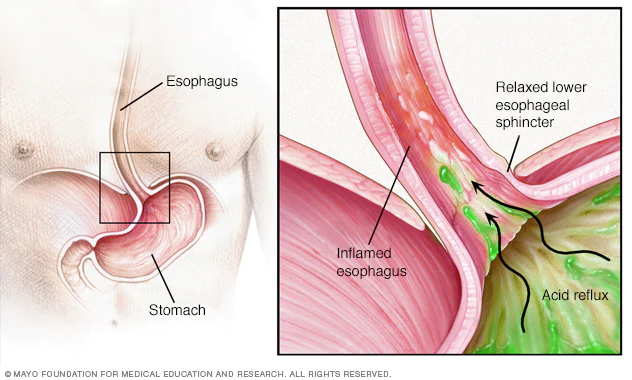
Heartburn Symptoms after VSG
 While most of us experience some heartburn from time to time, there is a small group of people who experience significant, daily heartburn that often interferes with sleep or their ability to enjoy a meal with friends. If heartburn is a daily part of your life, then a Gastric Bypass will most likely eliminate these symptoms, while the heartburn reducing effects of a Sleeve Gastrectomy are more variable. Some patients experience improvement of their heartburn symptoms after a Sleeve Gastrectomy, many stay the same and others report worse symptoms after surgery.
While most of us experience some heartburn from time to time, there is a small group of people who experience significant, daily heartburn that often interferes with sleep or their ability to enjoy a meal with friends. If heartburn is a daily part of your life, then a Gastric Bypass will most likely eliminate these symptoms, while the heartburn reducing effects of a Sleeve Gastrectomy are more variable. Some patients experience improvement of their heartburn symptoms after a Sleeve Gastrectomy, many stay the same and others report worse symptoms after surgery.
A significant percentage of patients will experience worsening of their GERD and heartburn symptoms after VSG. These patients may develop occasional or even frequent vomiting after eating as well.
There Are Many Causes of GERD after VSG

The cause of this is believed to be a narrowing or kinking of the mid-portion of the stomach or a breakdown in the anatomy of the valve that sits between your esophagus and stomach that helps to prevent acid from refluxing up into your esophagus. This partial obstruction from the narrowing or kinking increases the pressure in your stomach, and the increased pressure, along with a malfunctioning valve can result in significant acid reflux and heartburn.
For many post-surgical complications, there is relatively little difference between experienced surgeons. However, when it comes to GERD and heartburn symptoms after Sleeve Gastrectomy, there is a significant difference between surgeons. The incidence of increased GERD after VSG between surgeons can range from 18% to 45% – a 2 ½ times difference. This difference was not dependent on the age, experience or complication rate of the surgeon. In fact, we really have very little idea of what accounts for this significant difference (although I have some ideas….)
GERD after VSG rates are not made public
Unfortunately, GERD after Sleeve Gastrectomy rates after surgery are not made public and it can be very difficult to determine if your surgeon has a low rate of postoperative GERD. Perhaps the best way to get more information is to ask your surgeon how often his patients require heartburn medications after surgery. If he or she downplays the significance of heartburn after Sleeve Gastrectomy, they are likely not acknowledging this significant postoperative issue. If they recognize that heartburn does occur after Sleeve Gastrectomy and have a strategy for reducing it, it’s likely their patients have a low rate of GERD after surgery.
The Best Treatment of acid reflux after Gastric Sleeve is revision to a Gastric Bypass
While many patients will experience heartburn after a Sleeve Gastrectomy, there’s a significant percentage (5%) who suffer symptoms that are so severe that they choose to undergo revision to a Gastric Bypass. The good news for these patients is that revision to a Gastric Bypass is an incredibly effective treatment of GERD after Sleeve Gastrectomy, but the bad news is that they were essentially forced to have a Gastric Bypass – a surgery they specifically decided against when they first chose to move forward with weight loss surgery.
Surgery is Not Always Necessary for Treatment of GERD after Sleeve Gastrectomy
Many patients learn to live with their heartburn symptoms after Sleeve Gastrectomy and do not seek treatment beyond heartburn medications. If you choose not to seek further treatment for severe GERD and heartburn, you increase your risk of developing a condition known as Barrett’s esophagus. Barrett’s esophagus occurs when the lining of the esophagus changes from normal esophageal cells to those that resemble intestinal or stomach cells in response to constant exposure to refluxed acid. This change unfortunately increases your risk of developing esophageal cancer in the future by 10x or more.
Non Surgical Treatment Options for GERD after VSG
Treatment of severe heartburn symptoms after a Sleeve Gastrectomy can be very challenging. Some patients will respond to high doses of GERD medications like Prilosec® or Prevacid®. For those that don’t, there are several options beyond revision to a Gastric Bypass, however these should be considered experimental without any evidence that demonstrates that they are an equally effective treatment. Some options are to endoscopically apply radiofrequency waves to the lower esophagus, to surgically remove the narrowed segment and then reconnect it and even to place a magnetic device around the esophagus to block the acid reflux. All of these strategies have marginal success rates. Often times, patients with severe GERD after Sleeve Gastrectomy also have a hiatal hernia where the top part of the Sleeve pushes up into the chest. While repairing this hiatal hernia can be effective, its recurrence rate is relatively high (~50%).
GERD after VSG is a solvable problem
Without question, the most effective treatment for severe GERD or frequent vomiting after a Sleeve Gastrectomy is to convert the Sleeve to a Gastric Bypass. This treatment is nearly 100% effective, however, it results in a patient ending up with the long-term consequences of Gastric Bypass surgery after initially choosing a Sleeve Gastrectomy. All patients who elect to undergo a Sleeve Gastrectomy must understand that a small, but not insignificant number of Sleeve Gastrectomy patients may ultimately need to undergo revision to a Gastric Bypass.
Want to learn more about how we can help fix your Acid Reflux?
Get started below
Have questions? Not sure? Talk to our friendly team at (520) 298-3300


Had gastric sleeve June of this year EDG found a neuroendocrine tumor 5mm has been completely removed. Had a EDG three months later all clear question is taking 40 mg of
Omeprazole twice a day. Still getting heartburn question is do you think a patient like myself permanently will be unable to get a bypass because the Neuro endocrine tumor was located in the duodenum
Tough one – would need input from the oncoologist who handled your neuroendocrine tumore – you’re thinking about this correctly though – after revision, you would no longer be able to perform endoscopy and reach the duodenum easily. My sense is that it’s a necessary surgery given the severity of your reflux, but it may be worth trying other surgical options. I’m filming a video this afternoon that will cover this in more detail.